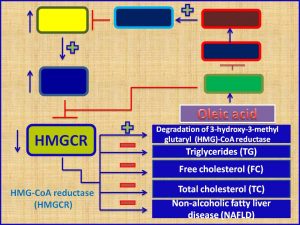Significance of the study:
Given that: (1) 15-30% of Western populations suffer from Non-alcoholic fatty liver disease (NAFLD), while only 6-25% of Asian populations suffer from it; (2) 75 to 100 million people in the US succumb to this disease; (3) obesity and type 2 diabetes are risk factors for the development of NAFLD; and (4) the global economic cost spent for NAFLD is enormous, there is an urgent need to find: (i) a way to decrease cholesterol deposition in liver; (ii) a cheaper alternative to the existing expensive drugs; (iii) a side-effect-free natural product-based drug; and (iv) a way to cure, not just treat, NAFLD.
From Research findings to Therapeutic opportunity:
This study suggests a molecular therapy for NAFLD. Oleic acid, by increasing the expression of its target gene, it may: (1) promote degradation of HMGCR; and (2) suppress the expression of HMGCR (Fig.1). Thereby, it may: (1) decrease Triglycerides, free chol esterol and total cholesterol levels; (2) attenuate lipid deposition in liver; and (3) inhibit progression to NAFLD (Fig. 1). Thus, pharmacological formulations encompassing “Oleic acid or its analogues, either alone or in combination with other drugs” may be used to treat NAFLD.
esterol and total cholesterol levels; (2) attenuate lipid deposition in liver; and (3) inhibit progression to NAFLD (Fig. 1). Thus, pharmacological formulations encompassing “Oleic acid or its analogues, either alone or in combination with other drugs” may be used to treat NAFLD.
[easy_payment currency=”USD”]

Figure 1. Mechanistic insights into how Oleic acid decreases the expression of HMGCR to prevent progression to NAFLD.
Details of the research findings:
Idea Proposed/Formulated (with experimental evidence) by: Dr L Boominathan Ph.D.
Terms & Conditions apply http://genomediscovery.org/registration/terms-and-conditions/
Undisclosed mechanistic information: How does Oleic acid decrease the expression of HMGCR to prevent progression of NAFLD?
Amount: $300#
# Research cooperation
For purchase and payment details, you may reach us at info@genomediscovery.org
* Research cooperation
References:
Web: http://genomediscovery.org or http://newbioideas.com
Citation: Boominathan, L., Molecular therapy for Non-alcoholic fatty liver disease (NAFLD): Oleic acid, isolated from Olive oil, sunflower oil and among others, promotes degradation of HMGCR, decreases the levels of triglycerides, free cholesterol, and total cholesterol and prevents the progression of Non-alcoholic fatty liver disease (NAFLD via down regulation of its target gene, 16/September/2017, 11.22 pm, Genome-2-Bio-Medicine Discovery center (GBMD), http://genomediscovery.org
Courtesy: When you cite, drop us a line at info@genomediscovery.org


